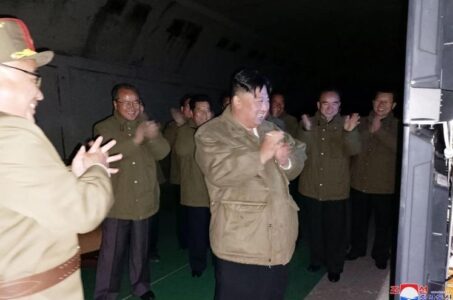
North Korea says it tested two nuclear-capable cruise missiles
North Korea has test-fired a pair of long-range strategic cruise missiles, with leader Kim Jong Un lauding another successful display of the country’s tactical nuclear strike capability.
The test, which took place on Wednesday, aimed at “enhancing the combat efficiency and might” of cruise missiles deployed to the Korean People’s Army “for the operation of tactical nukes”, state media KCNA reported on Thursday morning.
It was the latest in a series of weapons launches that have increased tension on the divided Korean Peninsula and heightened fears Pyongyang might be about to conduct its first nuclear test in five years.
The cruise missiles travelled 2,000km (1,240 miles) over the sea, according to KCNA, which said the projectiles hit their intended, but unspecified, targets.
Stressing that the test was another clear warning to “enemies”, Kim said the country “should continue to expand the operational sphere of the nuclear strategic armed forces to resolutely deter any crucial military crisis and war crisis at any time and completely take the initiative in it”, according to KCNA.
A US Department of State spokesperson declined to comment on the launches, saying Washington remained focused on coordinating with allies and partners to address threats posed by North Korea.
On Monday, North Korean state media reported that Kim had supervised two weeks of guided nuclear tactical exercises, including the test of a new intermediate-range ballistic missile (IRBM) that was launched over Japan as a protest against recent joint naval drills by South Korea and the United States that involved the nuclear-powered aircraft carrier, the USS Ronald Reagan.
Mistake to dismiss tests
North Korean state media once reported routinely on the country’s weapons testing but has stopped doing so in recent months.
Analysts say that while the recent “deluge of propaganda” could not be trusted, the tests should not be ignored.
“North Korea’s cruise missiles, air force, and tactical nuclear devices are probably much less capable than propaganda suggests. But it would be a mistake to dismiss North Korea’s recent weapons testing spree as bluster or sabre-rattling,” Leif-Eric Easley, a professor at Ewha University in Seoul, wrote in emailed comments.
“Pyongyang’s military threats are a chronic and worsening problem for peace and stability in Asia that must not be ignored. Policymakers in Seoul, Tokyo and Washington should not allow domestic politics and other challenges such as Russia’s war in Ukraine to prevent them from increasing international coordination on military deterrence and economic sanctions.”
North Korea’s cruise missiles usually generate less interest than ballistic weapons because they are not explicitly banned under UN Security Council resolutions.
Kim made acquiring tactical nuclear weapons – smaller, lighter and designed for battlefield use – a priority at a key party congress in January 2021 and first tested a “strategic” cruise missile in September of that year.
Analysts said it was the country’s first such weapon to have nuclear capability and was a worrying development because, in the event of a conflict, it might not be clear whether it was carrying a conventional or nuclear warhead.
The country revised its nuclear laws last month to allow preemptive attacks, with Kim declaring North Korea an “irreversible” nuclear power, effectively ending the possibility of negotiations over its arsenal.
President Joe Biden unveiled the latest update to the United States National Security Strategy on Wednesday but it contained only a single reference to North Korea.
Daniel Russel, the top US diplomat for East Asia under former President Barack Obama, said this was striking, “not only because it passes so quickly past a persistent and existential threat, but also because it frames the strategy as ‘seeking sustained diplomacy toward denuclearization,’ when North Korea has so convincingly demonstrated its utter rejection of negotiations”.
Source: Aljazeera





